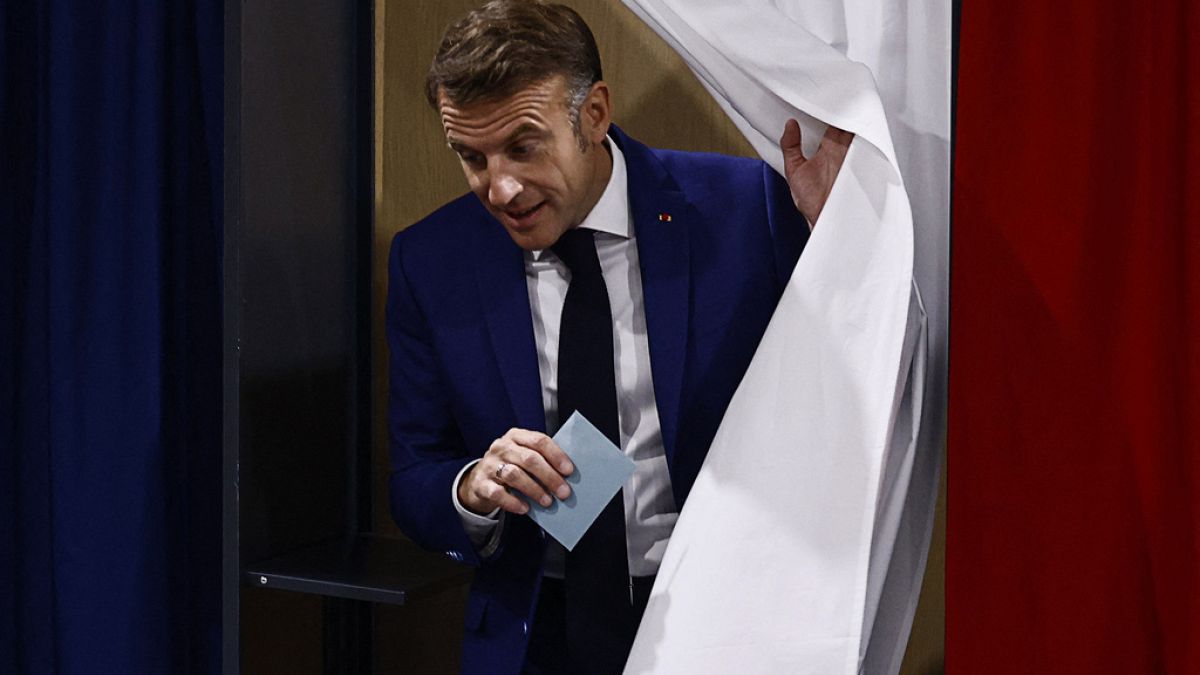After a new crushing defeat at the hands of the far-right in the first round of the legislative elections on Sunday, the future of French President Emmanuel Macron’s centrist party is at stake with some experts even questioning whether it will continue to exist.
French President Emmanuel Macron, who called the snap elections on June 9 after his party’s defeat in the European elections, saw his centrist coalition suffer yet another humiliating defeat this Sunday.
His alliance came in third with 20.7% of votes, while the alliance of left-wing parties, the New Popular Front, obtained 28.1%.
The far-right National Rally scored 33.5% and almost doubled its result compared to the last legislative elections in 2022.
What do these results mean for the presidential camp?
When French President Emmanuel Macron called for snap elections, he promised “a time of essential clarification.”
But after three weeks of rushed and confused campaigning, the results show the President’s gamble has failed.
“His party obtaining the third place in an election he provoked is a major defeat,” said Emmanuel Rivière, a political and polling expert.
In a written statement, Macron did not admit his party was defeated but instead called for “a broad, clearly democratic and republican rally for the second round.”
Macron and his allies have called on their supporters to prevent the far-right from taking office in the next round of the legislative elections scheduled for 7 July.
Gabriel Attal, Macron’s outgoing Prime Minister urged voters to prevent the National Rally from winning but also said that Jean-Luc Melenchon’s party, the France Unbowed is not a credible choice.
But the effectiveness of this “republican front” against the far-right has weakened over the years.
What’s next for Macron’s centrist party?
In many ways, this Sunday’s vote was a protest one against the president’s handling of key domestic issues, according to François-Xavier Millet, a political expert and professor at the University of the Antilles.
He told Euronews that “there is no hope for the presidential party in the short term.”
But in the long term, Millet believes Macron could still salvage what’s left of his party if the National Rally gains an absolute majority of seats: “If the far-right heads the government, Macron could try to regain some sort of political legitimacy in the long-term by presenting himself as a guarantor of the Constitution trying to safeguard the French from some of the far-right’s decisions.”
With an unprecedented number of seats heading for a three-candidate run-off, political bargaining is now going to start.
Parties will decide who should stand down in order to have the best chances of defeating far-right candidates in their constituencies.
Applications for the second round must be submitted before Tuesday 6 pm by candidates having obtained at least 12.5% of the votes of registered voters.
According to Emmanuel Rivière, the future of the centrist alliance is “under threat” as the political landscape will shift after these snap elections.
“Macron’s possible successors will try to build something new,” the polling expert explained to Euronews, referring to Macron’s former prime minister Edouard Philippe, who heads the Horizons centre-right party.
Just last week, Philippe accused Macron of “killing the presidential majority” and many more politicians from the presidential camp have voiced their frustration and disappointment over his decision to dissolve the National Assembly.
Many candidates running under the centrist alliance even refused to put Emmanuel Macron’s face on their election posters, fearing that his image could damage their chances of being elected.
Annabelle, 28, who lives in Paris echoed a similar sentiment. She voted for Macron this Sunday. “I think he disappointed a lot of French people and no one can ever trust him again.”
Read the full article here
